This text was obtained via automated optical character recognition.
It has not been edited and may therefore contain several errors.
^F.H. Claiborne /[ohn] F[rancis] H[amtrajnck] Claiborne was born near Natchez on April 24, 1807. He studied law in Virginia with a cousin, and planned originally to practice there; but delicate health caused him to return to Natchez. There he became active in journalism and politics. He was an active supporter 0/ Andrew Jackson, and himself served in both the Mississippi legislature and the United States Congress. In 1841 Claiborne became editor 0/ the Mississippi Free Trader, and in that journal he began his initial work on the history of Mississippi. Following this he edited newspapers in New Orleans before moving to Bay St. Louis, where he engaged in the growing 0/ sea island cotton and in full-scale historical writing. He spent a great deal of time on a history of the Southwest, but lost the completed manuscript in a sunken steamboat on the Mississippi River; from this he salvaged, he claimed from memory, only a part, published as The Life and Times of Sam Dale (1860). In 1870 he returned to Natchez to complete work on his very important magnum opus, Mississippi As A Province, Territory, and State, the first jlume of which was published in 1881. The manuscript of the second, completed in 1884, was destroyed when his home burned in March of that year; his shock and grief over this loss were so great that he died in Natchez, barely two months later, on May 17. Though he is primarily known to us as a historian, "Hough Riding Down South," reprinted here in facsimile from its first publication in Harper’s New Monthly Magazine of June, 1862, demonstrates not only his historian’s instinct to record the passing scene and his fine sense of humor, but also his appreciation of the special qualities of the Piney Woods land and people of over a century ago. ROUGH BIDING DOWN SOUTH. 20 XUCTIOKUXIMO » XlMIMim ROUGH RIDING DOWN SOUTH. ALONG the Gulf of Mexico, or wh\t the United States Coast Survey stylet the Mississippi Sound, extending across the State of Mississippi, with a depth in the interior of about one hundred miles, there lies a region of country usually denominated the Pine Woods. The soil is sandy and thin, producing small crops of rice, potatoes, and corn, a little cotton, indigo, and sugar-cane, for home consumption. But it sustains a magnificent pine forest, capable of supplying for centuries to come the navies of the world. The people are of primitive habits, and are chiefly lumbermen or herdsmen. Exempt from swamps and inundation, from the vegetable decomposition incidental to large agricultural districts, fanned by the sea-breeze and V_ sL. L.1___-f sL. which the brave old Ponce de Leon met his death in the lagoons of Florida in 1512, may be found any where, it will be in the district I am now wandering over. I have nerer seen so liappy a people. Not afflicted with sickness or harassed by litigation; not demoralized by vice or tormented with the California fever; living in a state of equality, where none are rich and none in want; where the soil is too thin to accumulate wealth, and yet sufficiently productive i to reward industry; manufacturing all that they wear; producing all they consume; and preserving, with primitive simplicity of manners, the domestic virtues of their sires. Earlr marriages are universal. Fathers yet infants in law, nnd happy grandams yet in the rigor of womanhood, •may be found in every settlement ; and numerous arc the firesides around which cluster ten or a dozen children, with mothers still lovely and buoyant as in tlie days of their maiden bloom. Leaving the Gulf shore at Pascagoula for the interior, in a couple of honrs the traveler finds himself on the banks of a broad, deep, beautiful river, the Escatawba, curving gently down to mingle with the ocean. It flows through a forest of colossal growth. Many of these hoary Titans were overthrown by the great hurricane of '52, which began at 10 x.M., August 24, and blew with increasing fury nntil 12 m. next day, raging with undiminished violence nntil 12 at night, when it began to abate. It tore away whole masses of bluff on the sea-shore, dug up the earth from the roots of trees, blew down the potato hills as it swooped along the surface, and prostrated forests in its mad career. Here, at what is now called Elder’s Ferry, once stood the lodge of the last chieftain of the Pascagoula*. His warriors had all perished in the fatal wars with the Muscogees of Alabama. Sole survivor of the last conflict, the enemy still upon his trail, he led the women aud children from the Escatawba to the sea, preferring death in its

Explorers Claiborne-1862---Rough-Riding-Down-South-(3)